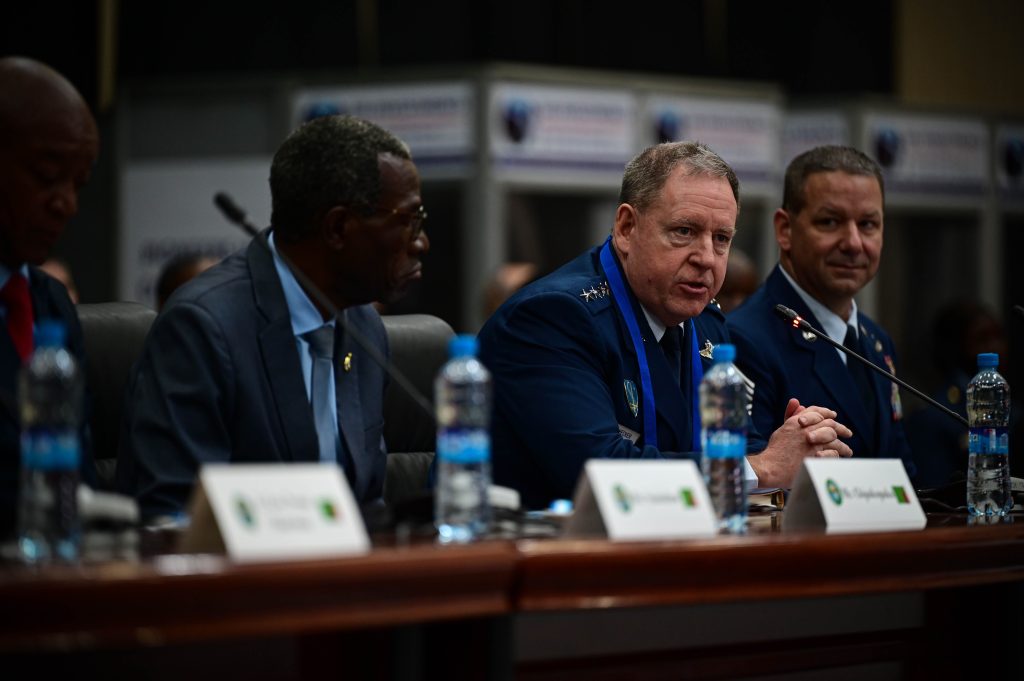The African Air Chief Symposium is a pivotal annual event that brings together African air chiefs and leaders from U.S. Air Forces in Europe – Air Forces Africa (USAFE-AFAFRICA). This conference serves as a platform to address continental defense issues and promote increased cooperation among nations.
The symposium offers U.S. representatives a valuable opportunity to strengthen their relationships with African partners. The opening ceremony set the tone for crucial discussions aimed at bolstering multinational collaboration and enhancing security cooperation across the continent.
The week-long symposium aimed to enhance the effectiveness of African air forces. The AACS brought together members of the Association of African Air Forces (AAAF) and included a variety of workshops, community engagement activities, and cultural exchanges. Its main objective was to strengthen regional partnerships and address key challenges, such as Humanitarian Assistance (HA) and Disaster Response (DR).
This year’s theme focused on crisis response capabilities of African air forces. A Table Top Exercise (TTX) was also conducted to improve coordination and readiness for HA/DR missions, with a particular emphasis on air mobility and resource sharing.
Additionally, the Air Chiefs engaged in bilateral talks, further enhancing cooperation among the participating countries. In 2025, AACS had the privilege of hosting 37 countries, including Kenya, Angola, Benin, Botswana, Burundi, Cameroon, Central African Republic, Chad, Comoros, Côte d’Ivoire (Ivory Coast), Egypt, Eswatini, Gabon, Ghana, Guinea Bissau, Lesotho, Libya, Madagascar, Malawi, Mauritania, Mali, Morocco, Mozambique, Namibia, Nigeria, Republic of Congo, Rwanda, Seychelles, Senegal, Sierra Leone, Somalia, Tanzania, Togo, Tunisia, USA, Zambia, and Zimbabwe.
Since its establishment in 2011, AACS has been hosted by a different member country of the Association of African Air Forces each year. In 2019, Kenya Air Force had the honor of hosting the event.
This ongoing collaboration and pursuit of operational excellence will continue to strengthen African air forces and promote regional stability in the years to come.
Gen. James B. Hecker, Commander of U.S. Air Forces in Europe – Air Forces Africa, and Lt. Gen. Oscar Nyoni, Commander of the Zambia Air Force, recently spoke about the upcoming African Air Chiefs Symposium, scheduled for February 17-21, 2025, in Lusaka, Zambia.

As chairmen of the Association of African Air Forces (AAAF), Hecker and Nyoni emphasized their enthusiasm for gathering all AAAF members to review progress from previous years and address challenges for the coming year. They also highlighted the symposium’s key objective: operationalizing AAAF and building momentum for a live-fly exercise planned for 2026.
The AAAF is a non-political, voluntary organization that promotes African-led air power solutions. It includes 29 African nations and the United States as chartered members. The AAAF’s mission is to foster and strengthen bonds of friendship, cooperation, collaboration, and mutual support among its members.
Lt. Gen. Jason T. Hinds, Deputy Commander of U.S. Air Forces in Europe – Air Forces Africa, met with Zambian Air Force members of the AAAF on January 14 during a planning meeting at Ramstein Air Base, Germany. The Zambian delegation included Lt. Col. Juliet Mbimbi, Women, Peace, and Security representative, Maj. Moses Sichilima, liaison officer, and Warrant Officer 1 Festus Mwelwa, senior enlisted representative. Representing Gen. James Hecker, Hinds discussed plans for the symposium in Lusaka and conveyed Hecker’s commitment to co-hosting the event.
The symposium will provide a forum for strategic dialogue among African Air Chiefs, allowing them to discuss common interests on the continent and foster cooperation. Through these discussions, participants aim to enhance security collaboration and address shared defense challenges, ultimately contributing to a safer and more secure Africa.
It’s 2023 edition communicated that African air forces can — and must — play a pivotal role in addressing these challenges by providing strategic airlift, humanitarian and disaster relief, and the ability to gather intelligence while monitoring threats.





